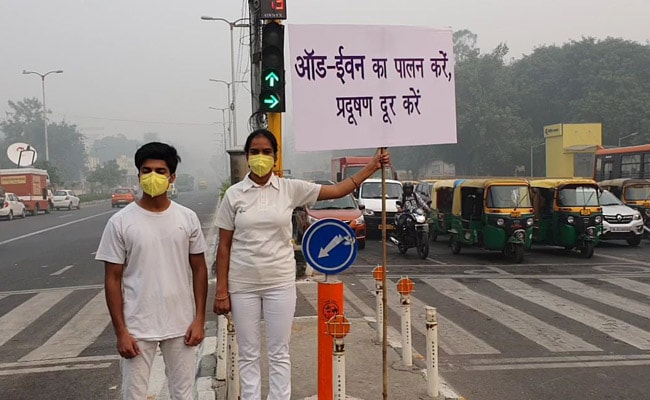
The odd-even scheme was to run from November 13 to November 20 this year (File).
New Delhi:
There will be no odd-even traffic restriction scheme in Delhi at this time, Environment Minister Gopal Rai said Friday afternoon, shortly after the Supreme Court left the decision on its implementation to the ruling Aam Aadmi Party. Earlier this week the court – irked by the annual (and worsening) air quality crisis in the city – called the scheme “optics” and demanded proof of success.
The odd-even scheme – which restricts (only privately-owned) car traffic based on registration numbers – was to have been enforced for this year from the day after Diwali (November 13).
The Delhi government will now only consider implementing the odd-even scheme after a review of air quality post-Diwali, Mr Rai said. “… an improvement is seen in pollution levels. The AQI, which was 450+, has now reached around 300. (So) the decision to implement odd-even from November 13-20 has been postponed. The situation will be analysed again after Diwali,” the minister said.
In today’s (now annual) Supreme Court hearing on the air quality crisis, the court was referred to a report that said the odd-even scheme reduces vehicular pollution by 13 per cent. The court was also told of a drop in kilometres travelled – an estimated 37.8 lakh per day when the scheme is in effect.
A Delhi government affidavit said this also translated into an average of 15 per cent lower fuel consumption per day (thereby also impacting, positively, the environment) during the scheme.
The court, however, pointed out the report also said vehicular pollution is only an estimated 17 per cent of the larger problem, and that the scheme only led to a 13 per cent reduction of that amount.
“Total vehicular pollution is 17 per cent. Of this… you are saying there is a decline of 13 per cent?” the court asked, before shrugging its shoulder and saying, “We are only flagging it. You take a call… you want to do it, then you can. Can’t then say ‘pollution because Supreme Court passed an order’.”
Of significance is the fact only private four-wheelers are subject to odd-even rules; two-wheelers and taxis are exempt, and, as of 2021, there are over 8.2 million registered in the national capital.
READ | “It’s Your Job”: Supreme Court’s Big Order For States On Delhi Air Crisis
Meanwhile, Delhi woke this morning to overnight rains that improved (slightly and temporarily) the air quality crisis; the AQI dropped from nearly 500 last night to 407 at 7 am. This, as the Supreme Court, was quick to point out, had nothing to do with any effort of the Delhi or central government.
READ | Pollution, Smog Ease In Delhi After Light Rains, More Showers Likely
“God heard peoples’ prayers and intervened… sometimes wind helps. But no thanks to government. (All) we want to know is… what is being done about farm fires, apart from waiting for rain?” Justice SK Kaul asked at the start of an intense hearing on the odd-even scheme and Punjab farm fires.
At the end of the hearing the court made clear its position to the concerned governments.
“Every year weather changes in this time… but you haven’t been able to solve this in six years?” Justice Kaul said, “Ultimately, little carrot, little stick. Do what you have to do, but get levels down.”
Delhi is reeling after a week of pollution that has seen PM2.5 levels as high as 100 times the safe limits recommended by the World Health Organization. It was the world’s most polluted city till Thursday.
NDTV is now available on WhatsApp channels. Click on the link to get all the latest updates from NDTV on your chat.




